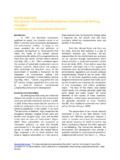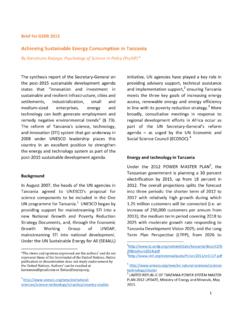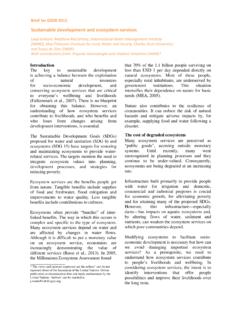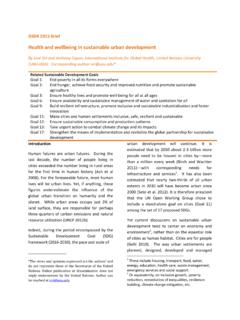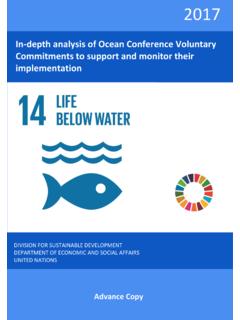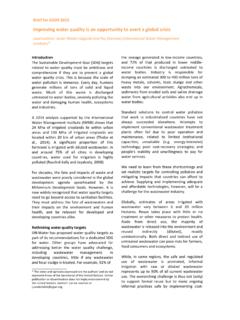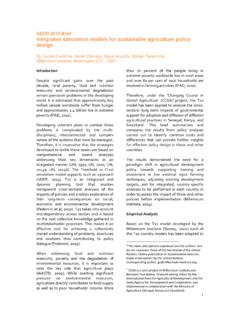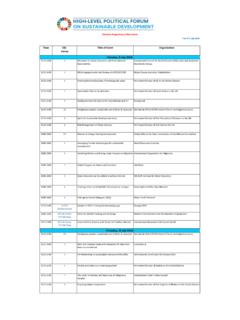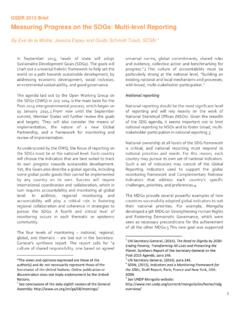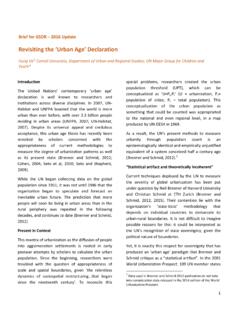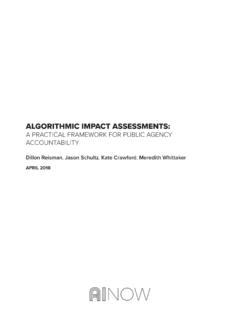Transcription of UNDP AND CIVIL SOCIETY ORGANIZATIONS A TOOLKIT FOR ...
1 UNDP AND CIVIL SOCIETY ORGANIZATIONSA TOOLKIT FORSTRENGTHENINGPARTNERSHIPSU nited Nations Development Programme Copyright UNDP 2006, all rights in the United States of AmericaCover images(clockwise from top left)Afghanistan Jacqueline Mia Foster/UNDPS udan UNDP SudanPanama Doranne Jacobson/UNDPEast Timor Jerome Ming/UNDPLao People s Democratic Republic Ruth Massey/UNDPP alestine Radhika Chalasani/UNDPD esign:Suazion Inc., Bloomingburg, NYProduction:American Printing International, New York, NYThe United Nations Development Programme (UNDP) is the UN s global development network, advocating for change and connecting countries to knowledge,experience and resources to help people build a betterlife. We are on the ground in 166 countries, working with them on their own solutions to global and nationaldevelopment challenges. As they develop local capacity ,they draw on the people of UNDP and our wide range ofpartners. In all our activities, we encourage the protectionof human rights and the empowerment of women.
2 UNDPANDCIVILSOCIETY ORGANIZATIONSA TOOLKIT FORSTRENGTHENINGPARTNERSHIPSU nited Nations Development Programme AcknowledgementsiForewordiiOverviewivFre quently Used Acronymsvii1. Defining CIVIL SOCIETY 12. Mapping CIVIL SOCIETY Organizations5nTable 1. Framework for CSO Mapping93. Operational Guide to Working with CSOs 11I. NGO as Implementing Partner13II. NGO Contract 16 III. NGO Grants17IV. Long Term Agreements18V. Partnership Agreements19nTable ofNGO of Selection Criteria to Assess CSO capacity 22nTable 3. CSO capacity assessment Tool234. The CIVIL SOCIETY Advisory Committee29I. CSO Advisory Committee to the Administrator31II. CIVIL SOCIETY Advisory Committee to UNDP in Botswana33 III. CIVIL SOCIETY Advisory Committee to UNDP in Brazil 35IV. United Nations Indigenous Peoples Advisory Committee of Kenya41V. Local CIVIL SOCIETY Advisory Committees to UNDP in Colombia,Liberia and Sri Lanka435. Community-to-Community Learning Exchanges 45nTable 4. Learning Goals: Teachers and Learners49nBox 1.
3 The Uganda Community-Based Association for Child Welfare (UCOBAC) and Grassroots ORGANIZATIONS Operating Together in Sisterhood (GROOTS) Kenya Learning Exchange49nFigure 1. Local Learning Phases50nLearning Exchange Model Agreement516. Resources53 Annexes69I. BCPR-BRSP Pilot Small Grants Programme for Strengthening CSOs in Post-Conflict Environments71II. Human Rights Strengthening Programme73 III. Partnership Agreement between UNDP and SNV75IV. Note on Community Dialogue Spaces77 CONTENTS ACKNOWLEDGEMENTSThis TOOLKIT is an initiative of the CIVIL SOCIETY ORGANIZATIONS Division inthe Bureau for Resources and Strategic Partnerships (BRSP). It has beendeveloped and coordinated by Alejandra Pero, with support from AtifSiddiqui, Bharati Sadasivam, and Emmanuel Bor. The CSO Divisionhas designed most of the CSO Division would like to thank country offices, regional servicecentres and headquarters units that contributed to the contents of thistoolkit.
4 Special thanks to Krishan Batra, Rema Devi, Dien Le, GeorginaFekete, Peri Johnson, Nina Kantcheva, Radhika Lal, Mari Matsumoto,Judith Puyat-Magnaye, Dominic Sam, Sean Southey, Eileen de Ravin,Patrick van Weerelt, and Caitlin Wiesen from headquarters, MainaDavid,Mar a Paulina Garc a, Petra de Le n, Marybeth McKeever,Devanand Ramiah, and Camila Zamith from the country offices, BjoernFoerde and Elizabeth McCall from the Oslo Governance Centre, andChristine Musisi,Geoff Prewitt and Patrick Tiefenbacher from theregional service KaneDirector, CSO DivisionACKNOWLEDGEMENTSiFOREWORDUNDP recognizes the multiple functions CIVIL SOCIETY ORGANIZATIONS play inaddressing the main challenges of poverty and environmental degradation,conflict and disaster, the HIV/AIDS pandemic and governance at alllevels, from the local to the global. The growing strength and sophisticationof CIVIL SOCIETY actors in the development arena presents us with newchallenges in building multi-faceted and creative alliances with civilsociety partners.
5 To design and sustain genuine partnerships with civilsociety actors, it is essential to understand the CIVIL SOCIETY sector, assessits capacities and weaknesses, and develop appropriate and effective toolsand instruments to engage with CIVIL SOCIETY ORGANIZATIONS (CSOs).This TOOLKIT , produced by the CIVIL SOCIETY ORGANIZATIONS Division in theBureau for Resources and Strategic Partnerships, is aimed at providingcolleagues with practical guidance and essential information in forgingpartnerships with includes examples of innovative country-levelmechanisms to build and strengthen collaboration with is a timely initiative, given the 2004 report of the Secretary-General s high-level panel of eminent persons on United Nations civilsociety relations, which has emphasized the importance of the UnitedNations broadening and deepening its engagement with CIVIL SOCIETY inall its forms. The panel recommended more meaningful interactionbetween CIVIL SOCIETY and the United Nations.
6 The panel s report and theUNDPANDCIVIL SOCIETY ORGANIZATIONS :A TOOLKIT FOR STRENGTHENING PARTNERSHIPSiiSecretary-General s response urge the United Nations to become moreoutward looking, engage with a plurality of actors and constituencies inpolicy dialogue as well as in programme implementation, and connect thelocal with the UNDP, the specific recommendations onstrengthening the UN system s engagement with CIVIL SOCIETY at thecountry level are especially significant. Further, the priorities emergingfrom the 2005 World Summit, ranging from the MillenniumDevelopment Goals to peace-building, peacekeeping, human rights,democracy and the rule of law, cannot be realized without the activeengagement of CIVIL SOCIETY UNDP we have much to learn and gain from creative and strategicengagement with CSOs at multiple levels. The Bureau for Resources andStrategic Partnerships remains committed to supporting UNDP countryoffices and regional service centres in broadening their understanding ofcivil SOCIETY actors and facilitating and strengthening partnerships withthem.
7 I hope this TOOLKIT will help you in this critical JenksDirector and Assistant Secretary General Bureau for Resources and Strategic PartnershipsFOREWORDiiiOVERVIEWThis TOOLKIT seeks to equip UNDP country offices with the essentialtools, instruments and information to build substantive partnerships withcivil SOCIETY ORGANIZATIONS (CSOs). It also provides examples of success-ful and innovative initiatives of UNDP engagement with CSOs at theprogramme and policy levels. While CSOs have a tremendous amountto offer UNDP in pursuing its mandate in ways that complement andsupplement its work with governments, country offices are often facedwith a number of issues as they seek to establish partnerships with civilsociety actors. The CSO Division has developed this TOOLKIT to respondto the most frequently asked questions from country offices and regionalservice centres. We are grateful for the valuable inputs from programmeofficers and CIVIL SOCIETY advisors from country offices, regional servicecentres and One provides the UNDP definition of CSOs and a briefdescription of their various roles and functions, as set out in the policy ofengagement with CSOs (2001).
8 (Most references to CSOs in this toolkitare to national and local CSOs, not international institutions and networks.) Chapter Two presents a methodology for mapping CSOs, aimed atassessing the strengths and weaknesses of CSOs working in a particularsector and identifying previously unknown CIVIL SOCIETY Three provides operational information on working with CSOs,outlining policies guiding implementation, contracts, grant making andpartnership includes guidelines for assessing CSOcapacity and a list of suggested criteria that can be used to select CSOimplementing Four describes the role, mandate and structure of the CSOA dvisory Committee to the Administrator, set up in 2000. It alsoprovides the methodology used by some country offices to set up nationalcivil SOCIETY advisory committees, such as in Botswana and SOCIETY ORGANIZATIONS :A TOOLKIT FOR STRENGTHENING PARTNERSHIPSivChapter Six describes an innovative mechanism for peer-to-peercommunity learning and includes a model agreement to establish anexchange between Seven contains a list of select CSO resources in areas such asNGO legislation, training, and assessments.
9 The section also includeslinks to UNDP policies and procedures that guide engagement with annexes provide further information on UNDP CSO Divisionprogrammes and initiatives. Annex I describes the BCPR-BRSP PilotSmall Grants Programme, launched in 2004, to strengthen partnershipswith CSOs at the country level in post-conflict environments. Annex IIprovides a brief description of the indigenous peoples component of theHuman Rights Strengthening Programme (HURIST), aimed at fosteringdialogue between indigenous peoples ORGANIZATIONS and UNDP at thepolicy level. Annex III describes the partnership agreement with SNV(Netherlands Development Organization), which led to the developmentof a three-year programme (2005-2007) aimed at strengthening theparticipation of local actors in the MDG and poverty reduction IV describes community dialogue spaces and highlights the key TOOLKIT is designed as a practical aid to colleagues.
10 We hope that itsuser-friendly format will encourage staff to make copies of specificcomponents for use in trainings,planning and is a work in progress that will continually be updated with relevant hope that the information contained in this TOOLKIT is useful to yourwork. We look forward to receiving your suggestions and inputs toimprove it The TOOLKIT is available electronically at the UNDP CSO Division website ( )and on the UNDP Intranet ( )FREQUENTLY USED ACRONYMSACPA dvisory Committee on ProcurementAWPA nnual Work PlanBCPRB ureau for Crisis Prevention and RecoveryBDPB ureau for Development PolicyBOMB ureau of ManagementBRSPB ureau for Resources and Strategic PartnershipsCAPC ontracts, Asset and Procurement CommitteeCBOC ommunity-Based OrganizationCOCountry OfficeCPAPC ountry Programme Action PlanCPOC hief Procurement Officer CSOC ivil SOCIETY OrganizationDGGD emocratic Governance GroupECOSOCE conomic and Social CouncilFfDFinancing for DevelopmentGEFG lobal Environment FacilityHURISTH uman Rights Strengthening ProgrammeINGOI nternational Non-Governmental OrganizationIPsIndigenous PeoplesIPOI ndigenous Peoples OrganizationIUCNW orld Conservation UnionLIFEL ocal Initiative Facility for the Urban EnvironmentLPACL ocal Project Appraisal CommitteeLTALong Term AgreementMDGsMillennium Development GoalsMoUMemorandum of UnderstandingNEXN ational ExecutionNGONon-Governmental OrganizationNHDRN ational Human Development ReportOHCHRU nited Nations Office of the High Commissioner for Human RightsOLPSO ffice of Legal and Procurement SupportPACP roject Appraisal CommitteePRSP overty Reduction StrategyPSIAP overty and Social Impact AnalysisSGPS mall Grants
